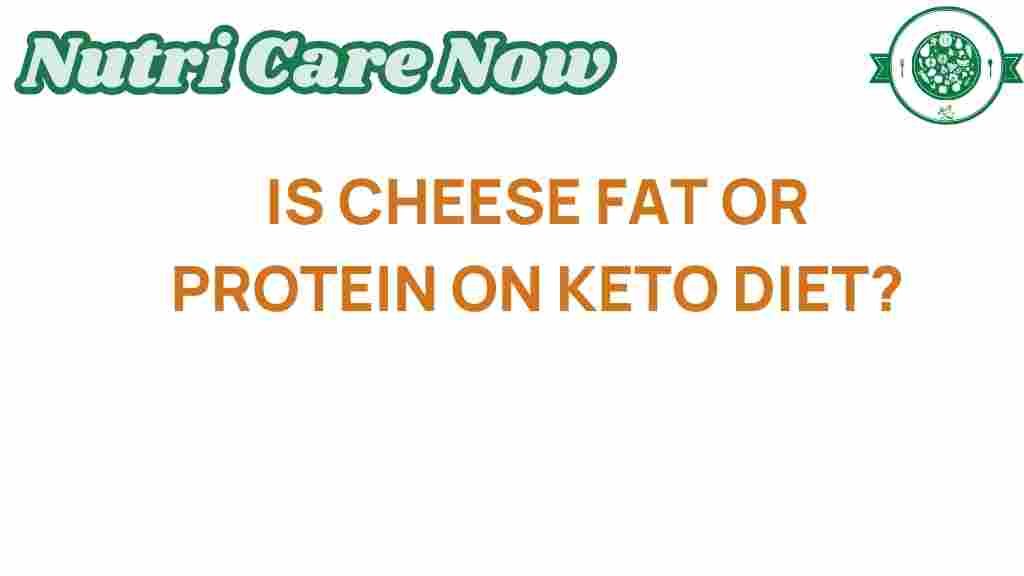Is Cheese a Fatty Delight or Protein Powerhouse on Keto?
Cheese has long been a staple in many diets around the world, and it has gained particular prominence among those following the keto diet. As a food that is both delicious and versatile, it raises an intriguing question: is cheese primarily a fatty delight or a protein powerhouse? In this article, we will explore the nutrition of cheese, its role in the keto diet, and how it fits into the broader context of low-carb eating. We’ll also delve into the health benefits of cheese, its fat content, and its value as a protein source.
The Role of Cheese in the Keto Diet
The keto diet focuses on high-fat, low-carbohydrate foods to induce a state of ketosis in the body, where fat is burned for fuel instead of carbohydrates. Cheese fits perfectly into this dietary approach for several reasons:
- Low in Carbs: Most cheeses have very low carbohydrate content, making them suitable for a low-carb diet.
- High in Dietary Fats: Cheese is rich in dietary fats, which is essential for reaching the high-fat intake goals of the keto diet.
- Rich in Protein: Cheese also provides a good amount of protein, making it a well-rounded food choice for those following the keto lifestyle.
Understanding Cheese’s Nutritional Profile
Cheese is not just about fat; it also contains various nutrients that can contribute to overall health. Here’s a breakdown of the nutritional components of cheese:
- Fat Content: Different types of cheese have varying fat percentages, generally ranging from 20% to 40% fat by weight.
- Protein Source: Cheese is an excellent source of protein, with about 6-8 grams of protein per ounce, depending on the variety.
- Vitamins and Minerals: Cheese is rich in calcium, phosphorus, and vitamins A and B12, essential for bone health and metabolic functions.
These components make cheese a valuable addition to the keto diet, providing both energy and essential nutrients.
Choosing the Right Cheese for Keto
Not all cheeses are created equal, especially when it comes to their fat content and protein levels. Here are some cheese varieties that are particularly keto-friendly:
- Cheddar: A popular choice, Cheddar cheese is high in fat and protein while being low in carbs.
- Parmesan: This hard cheese is very low in carbs and high in flavor, making it a great addition to various dishes.
- Brie: Creamy and delicious, Brie is also low in carbs and high in fat.
- Blue Cheese: Known for its bold flavor, Blue cheese is another fatty delight that fits well into a keto diet.
When selecting cheese, it’s essential to read the labels and choose varieties that align with your dietary goals.
Health Benefits of Cheese on the Keto Diet
In addition to being a tasty treat, cheese offers several health benefits, especially when incorporated into a low-carb diet:
- Supports Bone Health: The calcium found in cheese is vital for maintaining strong bones and teeth.
- Aids in Weight Management: The high fat and protein content can help keep you satiated, potentially aiding in weight loss.
- Improves Gut Health: Some cheeses, particularly aged varieties, contain probiotics that can benefit gut health.
- Boosts Nutrient Intake: By adding cheese to your meals, you can enhance the nutrient density of your diet.
In moderation, cheese can be a highly nutritious food choice that complements the benefits of the keto diet.
Incorporating Cheese into Your Keto Meal Plan
Adding cheese to your meals can be both simple and delicious. Here’s a step-by-step process for incorporating cheese into your keto diet:
- Choose Your Cheese: Start by selecting your favorite keto-friendly cheese.
- Pair with Vegetables: Combine cheese with low-carb vegetables like spinach, broccoli, or zucchini.
- Use as a Topping: Sprinkle cheese on salads, meats, or casseroles to enhance flavor and nutrition.
- Snack Wisely: Enjoy cheese as a snack with nuts or olives for a satisfying treat.
By following these simple steps, you can easily incorporate cheese into your daily meals while enjoying its rich flavors and nutritional benefits.
Troubleshooting Common Cheese Issues
While cheese is a fantastic addition to the keto diet, some individuals may encounter issues or concerns. Here are some common problems and their solutions:
- Digestive Discomfort: If you experience bloating or discomfort after eating cheese, consider lactose-free options or reducing your intake.
- Weight Gain Concerns: Cheese is calorie-dense, so moderation is key. Track your portions to avoid excess calorie intake.
- Quality Over Quantity: Opt for high-quality, full-fat cheeses, as processed cheeses may contain additives that are not keto-friendly.
By being mindful of these issues, you can enjoy cheese without compromising your health goals.
Conclusion
In conclusion, cheese is both a fatty delight and a protein powerhouse in the context of the keto diet. Its favorable fat content, low-carb nature, and rich protein source make it an ideal food choice for those looking to maintain a healthy, balanced diet while enjoying delicious meals. Whether you’re using cheese as a main ingredient or a topping, its health benefits are undeniable.
As with any food, moderation is essential. By incorporating cheese wisely into your meal plans, you can take full advantage of its nutritional benefits while keeping your keto journey enjoyable and satisfying. For more insights on keto-friendly foods, consider visiting this resource.
Embrace cheese as part of your food choices, and savor the delightful flavors while reaping the health benefits it offers.
This article is in the category Diet and created by NutriCareNow Team
